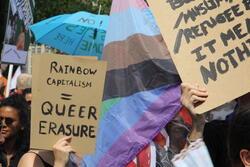Like Lilith, Re-channeling My Anger
On the 35th landmark anniversary of Lilith, a Jewish feminist magazine founded and edited by Susan Weidman Schneider, the magazine received a letter from Gloria Steinem praising Lilith for the change they had created “with anger and delight.” However, Weidman Schneider disagreed, saying that anger was not how they created change because it is not a teaching tool. She explained that to achieve change you need to educate people, understand their motives, and enable them to reach their own conclusion.
When I found myself faced with an issue that made me angry, my first instinct was in line with Gloria Steinem’s interpretation of how to influence change – with anger and delight. This October the “Don’t Say Gay” bill, formally known as the "Stop the Sexualization of Children Act,” was introduced to the House of Representatives by Rep. Mike Johnson, a Republican from Louisiana, supported by 32 other congressional Republicans. This bill made me angry as a person who believes in the importance of education. This bill made me angry as a woman who is attracted to more than one gender. This bill made me angry because it hurts people by targeting LGBTQIA+ specific resources and education. The bill would not allow educational institutions to use federal funding to purchase materials on topics such as gender identity and transition, which provide hope and valuable information for kids struggling with their gender identity. As I reflected on ways to combat the bill, I realized that, as Weidman Scheneider said, while anger can spark activism, it is not a teaching tool, and hence, not effective in driving change. With the knowledge of how she was able to use the magazine to completely change the way Jewish women are perceived, I decided to look back at her experiences with Lilith in order to turn my own anger into productive change.
I learned that at the time of Lilith's creation in 1976, the magazine’s work drew on righteous anger. Weidman Schneider had anger rooted in being told by other feminists that she should abandon Judaism because it was a patriarchy and that by staying Jewish she was being anti-feminist. Weidman Schneider and a group of women gathered to create a magazine with the goal to create a space for Jewish women to learn and discuss feminism and other women’s issues. While the first couple of issues discussed important topics, they were not able to produce change because they were written with an attitude that said “This is what’s wrong with the Jewish world. Here’s how you should fix it.” There was a hope that if these realities were spoken, then all wrongs could be fixed.
Soon, however, they were able to realize as writers that “persuasion and passion don’t always need to be seasoned with vinegar … especially when you’re trying to effect change within a community.” As righteous anger shifted to become educational, Lilith changed from telling the world what is wrong and right to asking questions about the motives of all sides, as well as trying to understand what those who disagreed believed. As a result, Lilith became more nuanced and developed as a teaching tool, helping to change the way Jewish women (and in current times, also trans and nonbinary Jewish people) perceived themselves, giving them the grounding to be firm in their own identities.
When considering how I can follow Weidman Schneider’s example as I look to confront the “Don’t Say Gay” bill, I realized that I needed to focus on external and internal change. External focus would involve understanding the motives of those supporting the bill and how to influence a change in these views. Internal focus would involve grounding myself in the many identities which interconnect to create the LGBTQIA+ community.
Focusing internally, I saw the impact of finding grounding in one’s identity across Lilith’s cover art over time. Where the cover of the first issue portrayed a Jewish superwoman with multiple arms holding up the different roles Jewish women played (scholar, challah baker, mother, etc.) that vision later evolved to portray the understanding that a Jewish woman does not have to live by the expectations of others but rather can make her own choices. The understanding that we don’t have to fulfill the expectations of others and can change the way we are perceived is especially important within the LGBTQIA+ community. There are a multitude of varied identities within the community but by grounding our individual identities we can be firm in the way we want to be perceived by others.
Focusing externally, the LGBTQIA+ community can use education to influence the supporters of the “Don’t Say Gay Bill.” To educate people, one needs to understand what is causing this immediate reaction of fear and hatred. Furthermore, one must question the motives of the bill and the support behind it in order to ensure this bill does not come to pass.
One of the stated motives behind the bill is protecting children. However, it claims to do this by denying children education. This education is important because gender dysphoria can start in childhood and refusing to recognize and support children with these struggles can, in some cases, lead to suicide. By refusing to educate students about the complexity of gender identity, we are telling kids who know but cannot name what is different about them that they are not “normal.” Furthermore, by preventing discussion about these topics, we are promoting hatred and bigotry.
As a member of the LGBTQIA+ community living in California when a version of the bill became state law in Florida, I was angry and afraid. While it did not affect me directly, its impact was felt across the US. For instance, all over the Internet, there was a rise in homophobic and transphobic comments. However, rather than reacting from a place of anger, the LGBTQIA+ community needs to follow the example of Weidman Schneider to use education in order to change the perception of this bill and of the community. Additionally, we need to find grounding within our own identities and how they connect to amplify our voices. We can tell people true stories about moments which changed our perception of ourselves and those around us. We can tell the stories of children with parents who are part of the LGBTQIA+ community and how this could impact them. We can look at the nuances, learn the motives of the bill’s advocates, and then educate to initiate change in our community and across America.
This piece was written as part of JWA’s Rising Voices Fellowship.







